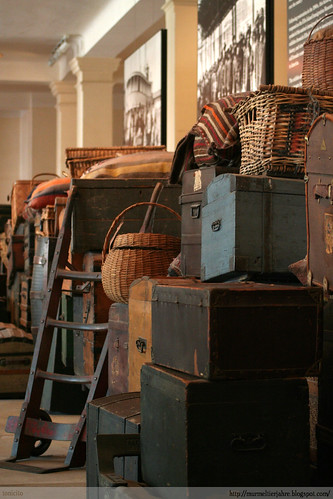Tuesday, 25 November 2008
Sunday, 16 November 2008
Through wars of worlds / invaded by Mars
A couple of weeks ago, October the 30th, was the 70th anniversary of the famous radio broadcast of "The War of the Worlds" adapted from H.G. Wells's novel.
This broadcast not only meant fame for a young Orson Welles, but there were also reports of thousands of frightened citizens blocking telephone lines by calling police stations and news agencies, really believing that the Martians just started an actual invasion of the Earth after having landed at Grover's Mill, New Jersey. Reports talked about mass panic as well, people fleeing their homes and driving miles away to seek shelter. Even though the general atmosphere of tension and anxiety that preceded World War II might have had something to do with these reactions, careful research points out that the reports were intentionally exaggerated by the press, in a time where many newspapers where concerned that radio, a new medium, would make them defunct.
This story is often taken as a proof of North-Americans' gullibility and ingenuousness. Not seldom you can see a self-satisfaction smile along the account of this anecdote, kind of: "Americans, you know...". You may see the same kind of smile on an European when reading "Employees must wash hands before returning to work" in US food court toilets, or when filling up the I-94W immigration form where, after questions like "Do you belong to a terrorist organization?", we are warned that answering YES to any of them might result in denial of our US visa. Sly smiles that come because we think we can see an idiotic society everywhere, to whom what is to be done must be always said, as if people were little children.
One of the things that make you feel bad when you live abroad, when you have to live your life in a different society, is the lack of cultural references, those millions of little details, winks, processes, conventions, that a native knows without being aware of it but that may suppose a big problem for you. Quite often you have the feeling that you are not getting it all right, that there is something that everyone knows but that you ignore, something that turns your mountains into sand corns for the native.
I already wrote about frames and its fragility, and about how they adapt to a new environment without us noticing it. But I am aware that you will never be able to erase this uncomfortable there-is-something-I-am-missing feeling, no matter how many years you live in another country. I think that the lack of the new country's cultural references is one of the toughest problems an immigrant has to face. That's why every help in this direction is more than welcome and having someone telling you how things work, what are you supposed to do, assuming no previous knowledge, no common frame, is a blessing.
The US, and North America in general, are a land of immigrants: there is almost no one there not having an ancestor born outside the US. Maybe that is the reason why every rule has to be stated in a very very clear way. The reason why everything has to be expressed without any margin to wrong interpretation. Maybe the need to harmonize several very different reference frames, and not an idiotic population, is what makes them appear little children to whom everything has to be explained. In a land of immigrants where everyone has its unique bias, its cultural nuances, an accurate setting of the rules of the game with no possible misunderstanding, is a must.
This summer I was, in a short period of time, in New York City and in Paris. And interestingly enough, in New York I never had the feeling of not knowing how to do something, where to wait for my luggage, where to wait for my turn in the lane or what was to be found at its end. A interesting feeling of comfort, as if the path to adaptation into that society had been thoroughly packed down long ago. Some days later, as I arrived in Paris, again in the Old Europe, not only did I need a while to understand where was my luggage, I surprised myself quite often thinking "Merde!, I am missing something again".
Tuesday, 11 November 2008
Thursday, 6 November 2008
Favonius at work
Yesterday morning, as I went out home at 6:45AM, with a scarf around my neck, I was welcomed by an incredibly warm November morning. Even though the Sun had not still risen, we might have had 18ºC! How was that possible? Is it because now, with Obama, it won't be cold in November anymore? ;)
No. It is the Alpenföhn, a unique wind effect that happens near the Alps. When an air mass has to rise to spring over a mountain range, water condenses and falls as rain on the windward side. Past the maximum elevation, the dry air "falls down" the slopes and raises temperatures by as much as 30ºC on the leeward valley.
(Picture taken from Wikimedia Commons)
The name Föhn comes from the Roman God Favonius, who personified the west wind. Later on, it went through Rhaeto-Romance favuogn and fuogn until it reached modern German as Föhn. Interestingly enough, a hair dryer is called Fön, without "h". I read that the name was registered as trademark by AEG on the 20s.
The Föhn is often associated with migraines and psychoses. A study by the Ludwig Maximilian University in Munich claims that suicide and accidents increase by 10 percent during föhn winds in Central Europe. In fact, there is a Föhnkrankheit (Föhn sickness), which might be the perfect excuse to justify low performance on the job, excessive appetite or, simply, general apathy.
Other föhn wind examples around the world include the Chinook in the Rocky Mountains, North America, the Halny in the Carpathian Mountains, Eastern Europe, fogony and cierzo in the Pyrenees and viento del sur (southern wind) in Cantabria, northern Spain.
And I think I'm going to let it go for today, because, you know, there is Föhn today...



 versión en español
versión en español






